Construction industry suicide in Australia: Mental health fears amid ‘unprecendented’ pressure on builders, subbies
Mental health, suicide. They’re hard issues to talk about but hundreds of men are losing their lives every year. Read our special report and see what’s being done about it.
Gold Coast
Don't miss out on the headlines from Gold Coast. Followed categories will be added to My News.
***WARNING, THIS STORY DEALS WITH MENTAL HEALTH AND SUICIDE***
IF YOU’RE EXPERIENCING ANY MENTAL HEALTH ISSUES, CONTACT LIFELINE IMMEDIATELY ON 13 11 14.
The construction industry is losing a worker every second day. Two-hundred a year.
Not to unemployment or lack of work, but to death. Suicide.
Workers up to the age of 44 in Queensland are two times more likely to take their own lives than the working-aged male population. It remains Australia’s biggest killer for young workers – and construction industry figures fear it is about to get worse.
“A friend of mine who is a subcontractor, a close friend of his took his own life,” said Association of Professional Builders founder Russ Stephens.
“The effect it has on other people, the family, close friends et cetera, it’s devastating.
“... One statistic that really stood out for me is that death by suicide is six times more likely than death by site accidents. That’s just mind-blowing.
“You think how much time and energy we put into workplace health and safety and rightly so, and yet suicide is six times a more likely cause of death.”
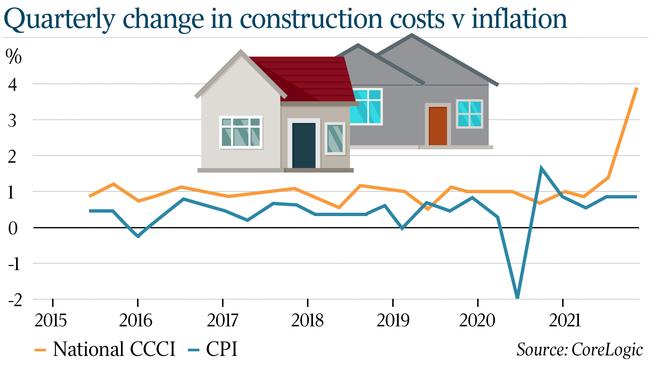
Labour and materials shortages, Covid disruptions and an unusually wet summer have led to rapidly rising costs and blow-outs in build times, causing many operators to finish jobs at a loss.
Mr Stephens, whose Gold Coast-based company helps builders better manage sales and finances, said a “large percentage” of those that came to him were stressed and “on a path” to greater anxiety and depression.
ABS figures indicate building costs rose 12.9 per cent in 2021. Further double-digit hikes are expected this year.
However, builders said the figures did not fully reflect the scale of the increases.
“Sub-contractors haven’t been able to get materials, which means they haven’t been able to work their teams on site so it’s stressful for those guys,” Mr Stephens said.
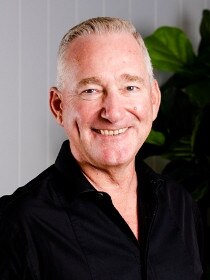
“It’s stressful for consumers because they’re having to find additional money for allowances that are in their contract, plus they’re having to pay rent for an extra period.
“In between those two parties you have the builder. They’ve got the pressure from the consumer who wants to see their home progressing, you’ve got the pressure from constantly rescheduling sub-contractors that can’t work because they can’t get materials.
“(They’re) constantly spending their time rescheduling, constantly in conversation with people and taking all the flak, and all the time they’re doing this they’re losing money.”
Mr Stephens said the “profitless boom” meant builders and subbies were finding it hard to make a living.
Many were quitting the industry.
“It’s unprecedented. I’ve never seen so many reports in our database of builders leaving the industry. They’re basically saying it’s too hard now, the government regulations are just too oppressive.
“I was talking to my head coach yesterday and he told me, ‘you know it’s bad when a builder tells you they’re closing their company and they’re going to work in their wife’s hair and beauty business’.
“That’s how grim the industry is.”
EMOTIONALLY OVERWHELMED
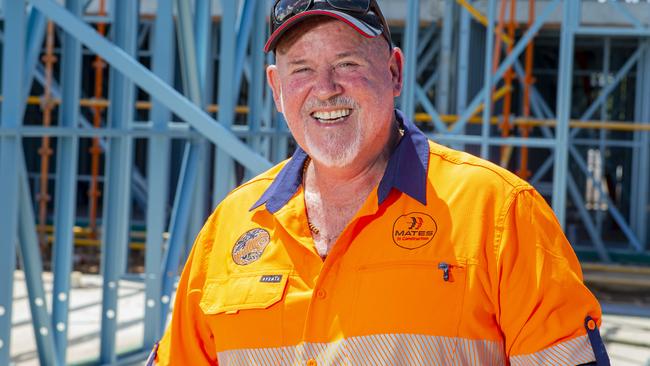
Mates in Construction Queensland CEO John Brady said long hours, disconnection from family and financial pressures contributed to high rates of suicide in the industry.
“They work long hours and often away from home, which puts pressure on relationships,” he said.
“They generally are working six days a week so they’re not connected into the community as much because they’re exhausted.
“When they have issues they tend to go to drugs and alcohol to calm it, rather than just solve the issues.
“Often they move pay cheque to pay cheque.
“And then you add on, now in the residential sector, they’ve quoted for work and now the cost of that work is much higher. The cost of resources to build it, and so they just take a loss, at a time when there’s lots of work.”
Mates In Construction is a charity that works to combat suicide in the building industry by training workers how to spot the signs a colleague is struggling and point them in the right direction to get help.
In the past 12 months they have visited 67 sites on the Gold Coast, training approximately 3500 workers.
“Sometimes it will be the weekend and it’ll go to shit and they’ll not know what to do, then one of their mates will go ‘you’re not right, I need to ring in’,” Mr Brady said.
“(Recently) we’ve had three of those. They came in on the weekend.
“There was one just this week where a guy from the Gold Coast was struggling and his mate went around and he had already hooked up the exhaust pipe into the car.
“And his mate had called around because he was worried about him.
“We train people to follow their gut instinct. If you think something’s not right it probably isn’t. So make a call, call in.”
Suicide remains the leading cause of death for Australians aged 15-44. In total, 3139 people took their lives in 2020.
In Queensland, suicide among construction workers aged 15-24 years was 2.4 times higher than the working-aged male population in Australia – and 1.9 times higher in Queensland.
Data from the University of Melbourne and Deakin University shows more than 190 workers in the industry are taking their life every year.
Mr Brady said men often felt they had to solve problems by themselves and were slow to ask for help.
“Normally, it’s not one thing that causes suicide, it’s one thing on top of another, and another and another,” he said.
“For the majority of people it’s being emotionally overwhelmed.
“If you think of men, what do men give to the world? We fix broken stuff. We’re good at problem solving.
“But when we have one thing after another we can get overwhelmed and, because we don’t seek help as a gender very often, it makes it very difficult for men to deal with the things they can’t solve by themselves.”
TELLTALE SIGNS
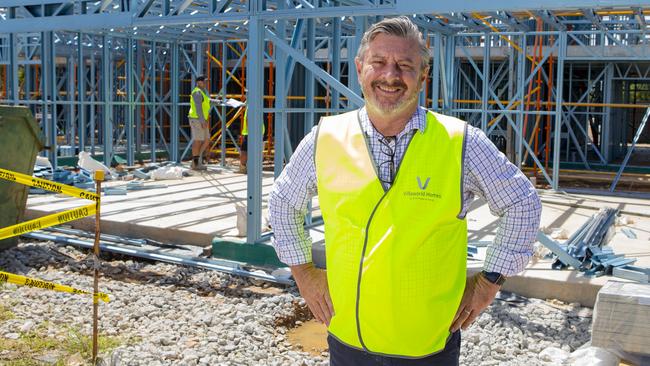
Peter Wood, the general manager housing with Villaworld Homes by Avid Property Group, said the pressures in the building industry were unlike anything he had seen before.
“I’ve been in this industry for 42 years, since starting an apprenticeship when I was 16. I have never seen conditions like this,” he said.
“I normally have a number of plans I can fall back on but I have zero plans left in the bottom drawer.
“Now it’s a matter of building the strongest relationships that you can so you’re not left behind and you get plenty of advance notice of pending price increases.
“... In this marketplace production times, delivery times of residential housing has doubled.
“It hasn’t in this business (Villaworld Homes by AVID Property Group), we’ve got a very well-oiled machine. But we’ve blown out by 25 per cent in terms of our production efficiency.
“The smaller operators, and even some of the bigger guys who over-committed, they’re out double their production time.”
Villaworld, which has a long history of building projects on the Gold Coast, has been working with Mates in Construction for more than six years, inviting it on to sites to train staff and donating more than $200,000 raised from its annual Golf Classic day.
Mr Wood said the association began because the company had noticed worrying signs in the industry.
“We could see, internally and externally, that there were issues that were being built up on construction sites.
“One person today whose demeanour is fine and he doesn’t look too uptight and then the next day seems to lose his cool.
“So we just started to look at some of the background to this to see what could be causing some of these dramas.
“... Nearly 200 people a year in the construction industry take their life – that statistic wasn’t lost on us. Some of them, potentially, could be on our sites.”
Mr Wood, who is also Queensland President of the Housing Industry Association, said he had encountered a number of people who had considered taking their own lives.
“I’ve seen many people that have suffered, to the point where you look out now for people whose demeanour changes overnight,” he said.
“You can tell something is not necessarily right with them. Where ordinarily they’d be a happy, functioning sub-contractor they seem to take on a different persona.”
PEOPLE SAVING PEOPLE
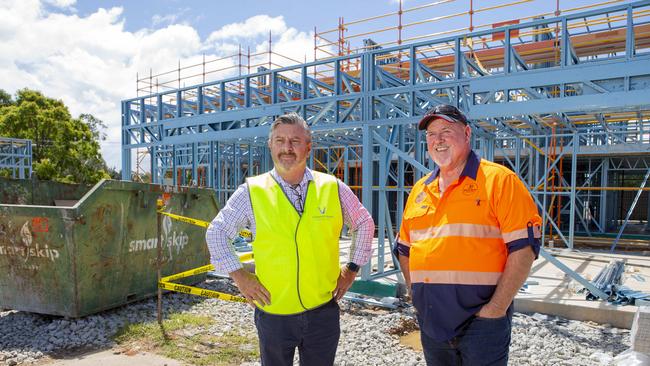
Mr Brady said statistics showed that most major building sites would have someone who was struggling. He said workmates could not expect to solve the problems those people were experiencing, but more often than not were the ones who helped direct them to get the help they needed.
“Australia has heaps of helplines. We’ve got a helpline 24/7,” Mr Brady said.
“But helplines don’t save people, people save people.
“So the best thing to do is, if you see a mate struggle, is say, ‘mate I can’t fix you, but I’ve got a number of some people who might be able to help you. What if I dial the number and you speak?’
“A lot of the calls to our helpline have people sitting with someone.
“... If you know a mate’s struggling, for heaven’s sake give him a ring and ask ‘how are you travelling?’ Just that conversation can be life-saving.”
‘HIS ANXIETY WAS ON THE NEXT LEVEL’
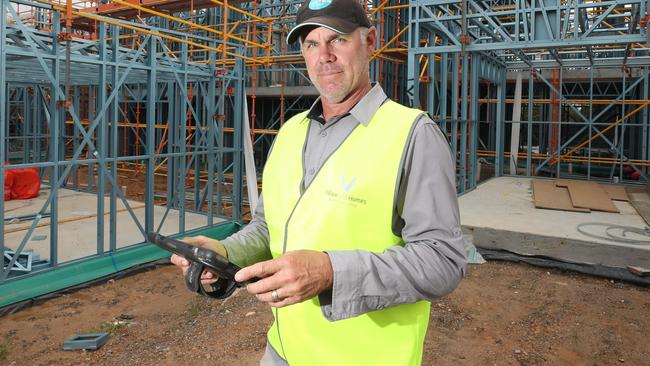
Few people know better the pressures on the building industry – and how they risk leading to tragedy – than Tim Bale.
Mr Bale, a site manager with Villaworld, had two friends attempt suicide.
The experience inspired him to train as an “assist” with Mates in Construction, which the charity says is comparable to being a first aid officer on site.
The training led him to a shocking realisation – what he had said to those two mates in their hours of darkness was wrong.
“Everything Mates said, ‘don’t do this, don’t ask that, don’t tell them these reasons’, they were all the things that I brought up with my two mates about why you shouldn’t commit suicide,” he said.
“They were the wrong things to say. Because I don’t know the reasons they’re in that dark place.
“I was saying, ‘what about your children, what about your wife, what about your jobs and your friends’ and all this. But the way John (Brady) put it to us was, someone that’s in that mindframe has already put a plan in place.
“They think that if they do away with themselves their wife will be happy, (she’ll) take care of their kids, maybe there’s insurance, and the insurance will pay out the home, the wife will have no money issues and everyone will be better off without me. Job done.
“... So (Mates) gave you that training to basically stop talking and to wait for that ‘but’, or that pause, that sigh. That’s your avenue, it’s a glimmer of confusion in their head where they’re not 100 per cent set on it, hence why they’re still sitting in front of you.”
Mr Bale said the training proved invaluable.
“I did it within three weeks of training, with a guy on my site,” he said.
“I had coffee with him.
“He probably wasn’t too far along, but at the same time, I don’t (normally) have coffee with my trades on site.
“.... His anxiety was on the next level. He was a subbie. They sometimes allow it to build up on themselves a bit much.
“He’s a great guy, back on track now. You’d never know.”





